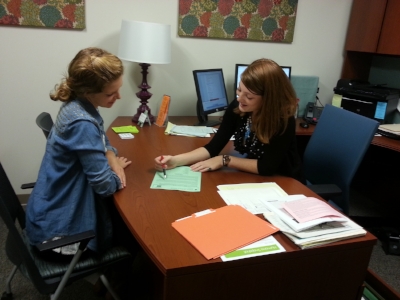
Q: My daughter is starting college this fall and I know she’ll be busy with classes and studying. When is a good time to begin career planning?
A: Career planning should actually begin on the first day of college. Here are some ways a student can get started:
1) In the first semester, schedule meetings with advisors. Your daughter’s academic advisor can help her define her goals and plan her educational journey so that she takes all the courses she needs to pursue her chosen career in a timely fashion.
2) She should also be speaking to advisors in the career services office during her first semester. A career advisor can help her learn about various careers open to people in the field she chooses, what’s involved in terms of day-to-day responsibilities in various settings, specific training required, job flexibility, workplace culture and salaries. Your daughter can think about what she’s heard, research these settings by talking to people she knows or family friends who work in the field and then start zeroing in on what she thinks is a fit for her.
3) By the second semester, she should be talking with the career services center about securing an internship in her chosen field. Once she has taken several courses in her chosen field, she is ready to pursue an internship. Having exposure to the field and some work experience on her resume will make her more competitive and attractive as a job candidate when she graduates. In many fields, there are numerous settings in which one can work (marketing professionals can work in a corporate, nonprofit or government setting; social workers can work in a counseling center, hospital, drug rehab center or more), and students who pursue multiple internships while in college can discover which setting within a field works for them. The internship also helps students network with potential employers and others in the field and may lead to a full time job offer upon graduation.
4) Another benefit of doing an internship is that it allows students to learn more about a profession before they enter the job market. Sometimes that experience reconfirms students’ career path, but sometimes students find that their internships didn’t work. Some students love the academic coursework relating to a field, but through an internship they may realize a job in that field may not be a fit for them. Through their internships, they can learn about other fields that are a better fit for their strengths and interests. It is far better to find that a field is not right for you when you are a sophomore in college than when you have already graduated and invested much time and money in pursuing a given career. Your daughter should discuss her experience—pros and cons—with her career advisor to help plan the next steps in her career path.
5) After your daughter completes her internship, she should schedule another meeting with career services to process her internship experience. This is when she can talk about what she liked about the setting/duties/field, and what she didn’t like, to help her figure out the next steps in terms of whether this career path/setting is for her, whether she should pursue something else, or perhaps secure another internship in a different setting in the same field. Career services can also help ensure that your daughter does appropriate follow up with the internship supervisors so that she can obtain recommendations for future employment at that employer or another one.